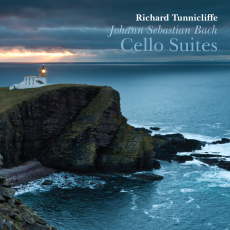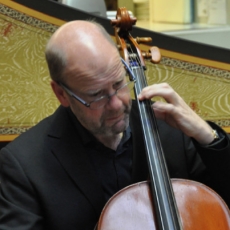Richard Tunnicliffe - J.S. Bach: Cello Suites - MusicWeb International
Having greatly enjoyed Richard Tunnicliffe's voyages of discovery with the Avison Ensemble, I was looking forward to hearing him in this more familiar repertoire. For all the small reservations which I'm about to express, let me say at once that this new recording is a fine addition to the list of distinguished recordings of these Cello Suites.
Any recording of the Bach Cello Suites has a number of formidable obstacles to overcome. First and foremost the music must retain its cerebral and academic appeal yet at the same time retain the character of the dances which it incorporates and appeal to the emotions - a problem which these suites share with the Goldberg Variations and the Well-tempered Klavier. Then the performances must compete with a number of highly recommendable predecessors, both recent and historical, from Pablo Casals, via Paul Tortelier (EMI Classics for Pleasure) and Pierre Fournier (DG) to Stephen Isserlis (Hyperion CDA30001/2 - see October 2010 Roundup).
The Isserlis has become my benchmark recording and it comes at mid price on CD, though the downloads are charged at the regular £15.49 for the two CDs, mp3 or lossless. Linn have trumped Hyperion price-wise by offering all versions, from mp3 (£8.00) to 24-bit (£18.00) and hybrid SACD (£15.00 - slightly less from some dealers) as 2-for-1. Whereas Isserlis reports having toyed with using a 5-string cello for Suite No.6 but eventually opted to play it on the conventional 4-string instrument, Tunnicliffe uses a 5-string instrument of the kind apparently required for one of Bach's cantatas. Both the instruments employed date from the 1720s, the period in which the suites are believed to have been written.
Three clear advantages, then, in terms of the instruments employed, the availability of 24-bit downloads as well as mp3 and 16-bit, and the asking price. Tunnicliffe's tempi throughout Suite No.1 are slower than those of Isserlis though not by so much as to make the differences blatant. Tunnicliffe's slightly slower time benefits the sarabande (track 4), by definition a stately dance, but there's no lack of stateliness in Isserlis' performance and the minuets (track 5) and the final gigue (tr.6) benefit from his slightly faster, more rhythmic and ultimately more imaginative approach - the difference is only really noticeable, however, playing one after the other, which you are hardly likely to want to do normally. I enjoyed Tunnicliffe's performance in its own right and that enjoyment is not erased by my liking Isserlis just that little more.
There's a more extreme difference of opinion in the case of the allemande of Suite No.2 (tr.8) where Tunnicliffe takes half as long again as Isserlis (3:47 against 2:33). Casals and Tortelier also take this movement at roughly the same speed as Tunnicliffe, while Fournier is a little faster but still closer to the consensus. Only Rostropovich (EMI and Supraphon) of the versions which I checked comes close to agreeing with Isserlis. Surely the consensus must be right? Perhaps, but I can't help feeling that Isserlis's approach is more imaginative again, retaining the stateliness associated with the allemande yet bringing the music to life for the modern listener. No-one is likely to want to sit through all six of these suites in one sitting but if anyone can tempt you to do so it's Isserlis.
It's in Suite No.6 that Tunnicliffe scores with his use of the 5-string instrument, for the very reason which Isserlis gives for having tried and rejected it, its comparative lightness of tone. His tempi here, too, are fresher, more dancing; he's actually faster in some movements than Isserlis. I haven't enjoyed the gavottes (tr.35) so much since Segovia's classic guitar transcription and the final gigue (tr.36) rounds off the recording in fine style.
Isserlis includes some bonuses to fill out two slightly short CDs - Sally Beamish's arrangement of the traditional Song of the Birds and some alternative movements from Suite No.1 - but Linn's 2-for-1 price trumps that. Both recordings are excellent - I listened to the Linn 16-bit version, equivalent to Hyperion's lossless version - and both come with first-rate booklets of notes. Overall, then, it's a case of swings and roundabouts. I marginally prefer Hyperion's swings to Linn's roundabouts but it's close and I shall continue to listen with great enjoyment to both these recordings.

